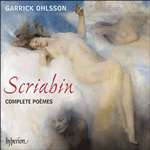|
Back
06/18/2015
'Complete Poèmes'
Alexander Scriabin: Deux poèmes, opus 32 – Poème tragique, opus 34 – Poème satanique, opus 36 – Poème, opus 41 – Deux poèmes, opus 44 – Feuillet d’album, opus 45, n° 1 – Poème fantasque, opus 45, n° 2 – Scherzo, opus 46 – Quasi valse, opus 47 – Rêverie, opus 49, n° 3 – Fragilité, opus 51, n° 1 – Poème ailé, opus 51, n° 3 – Danse languide, opus 51, n° 4 – Trois morceaux, opus 52 – Ironies, opus 56, n° 2 – Nuances, opus 56, n° 3 – Deux morceaux, opus 57 – Feuillet d’album, opus 58 – Poème, opus 59, n° 1 – Poème-nocturne, opus 61 – Deux poèmes, opus 63 – Deux poèmes, opus 69 – Deux poèmes, opus 71 – Vers la flamme, 'Poème', opus 72 – Deux danses opus 73
Garrick Ohlsson (Piano)
Recording: Henry Wood Hall, London, England (December 20-22, 2013) – 79’48
Hyperion #CDA67988 – Booklet in English, French and German

   
If there’s an issue with Garrick Ohlsson’s new recording of the purported complete Poèmes by Scriabin (not every item on the CD bears the specific title), I’d say the concept is commendable. While it encompasses several works that neither Sviatoslav Richter nor Vladimir Horowitz recorded, the result is less engaging than even the composer’s most dedicated admirers might have anticipated.
One problem is that (with few exceptions such as Vers la flamme) most of the disc’s 34 tracks have a slow, dreamy and almost improvised nature. After a while, a certain longueur sets in. Most of these pieces are quite short, and work beautifully in carefully curated concert groups or as encores, but they don’t encompass sufficient range of mood or imagination to maintain listeners’ attention as does complete sets of Préludes by Chopin or Debussy.
And this difficulty is compounded by Ohlsson’s decision to play most of the works with a laid back, low key approach which sometimes borders on soporific. It is particularly strange coming from a pianist whose career was kick started by some of the most demanding virtuoso repertoire from Chopin, Liszt and Rachmaninoff.
There are further problems with the recording venue, choice of piano and approach to acoustics. This is a new digital recording, yet the overall range in dynamics from the Steinway piano (presumably a Hamburg Steinway) is readily eclipsed by analog stereo recordings from Richter and Horowitz made 50 years ago. (SONY Classical has just remastered all of the latter’s Scriabin recordings from RCA and Columbia.)
The opening Poème in F-Sharp major, opus 32, n° 1 is a work of sublime, almost supernal sensuality with its lush harmonics, richly pedaled chording, and teasing, feathery moments of exquisite transparency. But Ohlsson appears to sight read the work, or at best, not to go out of his way to do anything that might be construed as copying Horowitz (who recorded the piece at least three times, studio and live performances.) Years ago, Ohlsson acknowledged being a Horowitz imitator during his youth. He wasn’t the only one. Today, however, he’s a mature artist, a man in his 60s who surely knows his own mind, no longer needing to concern himself with how others (including published reviewers, not to mention armchair critics) may react to his artistic decisions.
Ohlsson does warm more to the CD’s later works, when Scriabin was becoming even more obsessed with mysticism: millennium audiences may liken both Poèmes, opus 69, and, of course, Vers la flamme to global warming or a nuclear holocaust.
Charles Pope Jr.
|